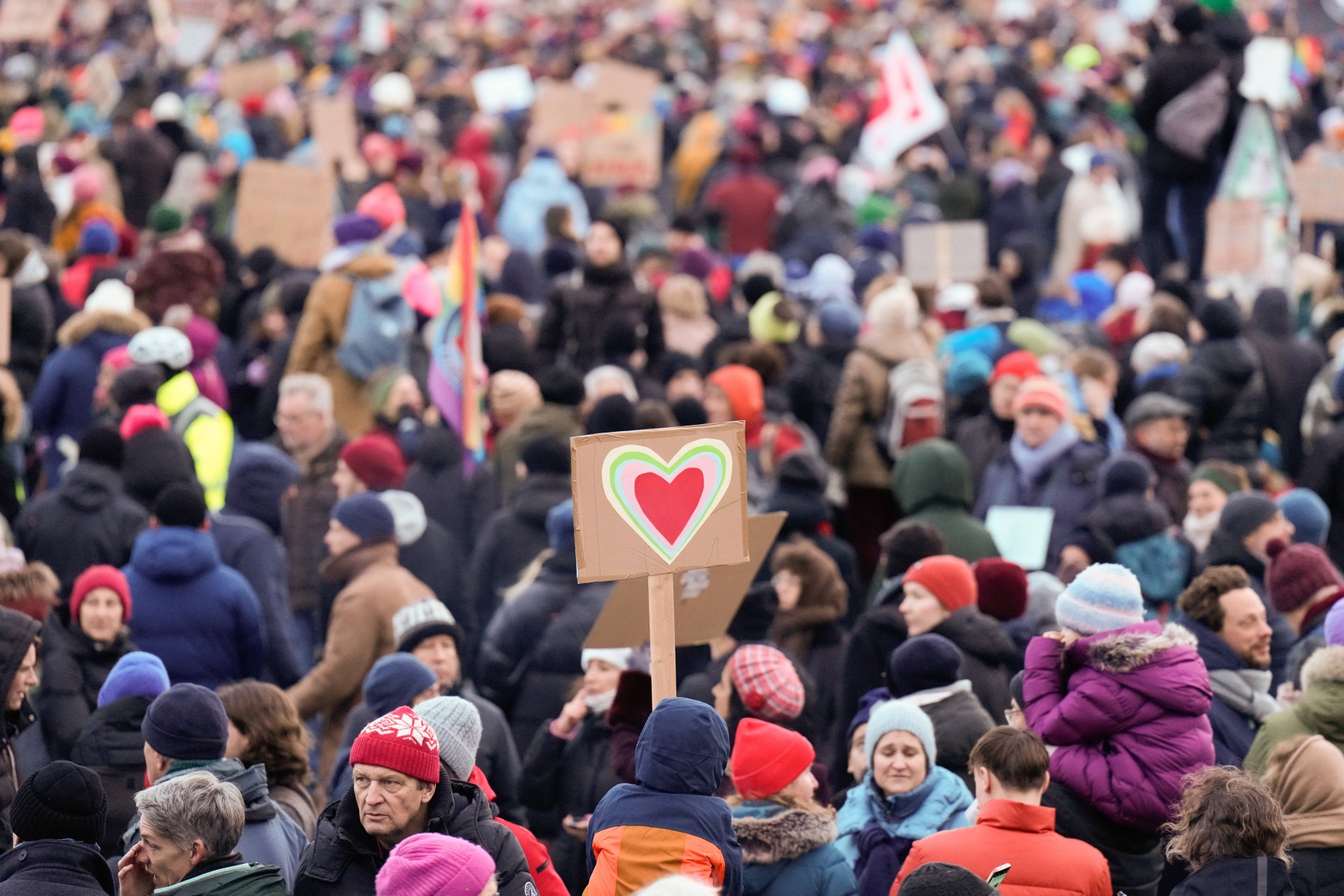Democracy — A Muscle That Needs to be Exercised
In recent weeks, hundreds of thousands have taken to the streets in Germany to protest against the radical right and in favor of democracy. And there are plenty of additional ways to strengthen democracy. Our Program Director for Democracy Antje Scheidler explains how we can stand firm.
Right now, the concern around our democracy can be heard and felt everywhere. In these times, hundreds of thousands of people are turning out in protest against right-wing extremism and in support of democracy. The catalyst for the mass protests was an exposé by Correctiv, an independent investigative outlet, of a covert meeting in November 2023, which saw representatives of the far-right Alternative für Deutschland (AfD) party, members of the “Values Union,” businesspeople, and a leading figure behind the “Identitarian” movement discuss plans for the forced deportation of millions of people with a migrant background.
The country’s shift to the right, which has now galvanized many, is not new. According to the latest Mitte Survey 2022/23, extreme right-wing attitudes have “surged, and more are occupying the middle ground.” At the same time, there is a growing distrust of democratic processes and institutions—in fact, of politics as a whole—as the handling of current crises such as high inflation, rising energy prices, and wars threatens social cohesion. A 2023 study by the think-and-do tank More in Common concluded that almost 70 percent of the population feel “left alone” in the crisis by politicians. The scale of the discontent recently became apparent in the farmers’ protests, too, whose actions were welcomed by many as a general stand against federal government policy—against “those people up there.”
Mass demonstrations such as we are now seeing tend to come and go in waves, but they are just one of many ways we can express ourselves in a democracy. It is incumbent upon all of us to actively practice democracy, to shape it, and defend it against hostility. And this can and should happen everywhere—in schools, in the workplace, but also in everyday spaces and leisure venues.
We have many possibilities at our disposal to get involved in this democratic structure as befits our respective talents and inclinations. Some are being trained as campaign workers, others are active in parties, citizens’ initiatives, or works councils. Still others contact their political representatives directly or arm themselves with knowledge and argumentation skills against the spread of fake news and hate online. A constructive culture of dialogue and the ability to tolerate different opinions are all-important for getting along with each other in a pluralistic society.
Projects the Robert Bosch Stiftung is running to strengthen democracy
With our “Everyday Spaces” (“Allzeitorte”) project, we want to create opportunities for engagement in places where people would come together anyway, where they like to hang out—in their everyday lives and in their leisure time. We want to reach those people who feel neither heard nor spoken to by politics. Together with the Federal Association for Socioculture, we are supporting ten collaborations of actors from civic education, sociocultural centers, and everyday or leisure spaces to jointly develop and test ideas for low-threshold democracy work. Whether in their local soccer club or favorite corner bar, in the “Everyday Spaces” projects, people can experience the value of democracy and community for themselves. The mix of different actors in this project will ensure that democracy is co-created locally and strengthened with lasting effect.
In the area of democracy, we promote the low-threshold and real-life teaching of democratic skills, focusing on innovative formats and unusual venues. Another focus is on inclusive and politically connectable formats for citizen participation.
Innovative forms of civic engagement, too, such as citizens’ assemblies, are an option for sociopolitical involvement, whether at the national level, as in the Citizens’ Assembly on Food used by the federal government, or at the local level. In our new project “The Future is Served!” (“Zukunft aufgetischt!”), for example, we are supporting municipalities to exchange ideas with local people in different participation formats: How should local food systems be designed? What are we eating in our schools and cafeterias? Can we designate areas for residents to grow their own food? People learn self-efficacy, for example, when they are able to help shape their environment, when they are listened to and included in decision-making processes.
Those who contribute realize that their voices count and we all have a degree of influence
Deliberative participation formats, if they are done well, are a great complement to representative democracy. Those who take part frequently report that it gives them a better understanding of complex political decision-making processes, not to mention building trust in democratic institutions and processes—the cornerstones of our democracy. Beyond that, policymakers can benefit from the resulting recommendations and use them to make decisions.
It is this mosaic that we need—as many people involved as possible, preferably everywhere, ideally long-term. Those who contribute can realize that their voices count, that their opinions will be heard, and that we all have a degree of influence. We just have to make use of this and roll up our sleeves. It’s like exercising: We need strength and stamina to keep democracy resistant and stable.
I’ll end with a request: This year is full of elections—at the local, national, and EU levels. Let’s all make our votes count!

